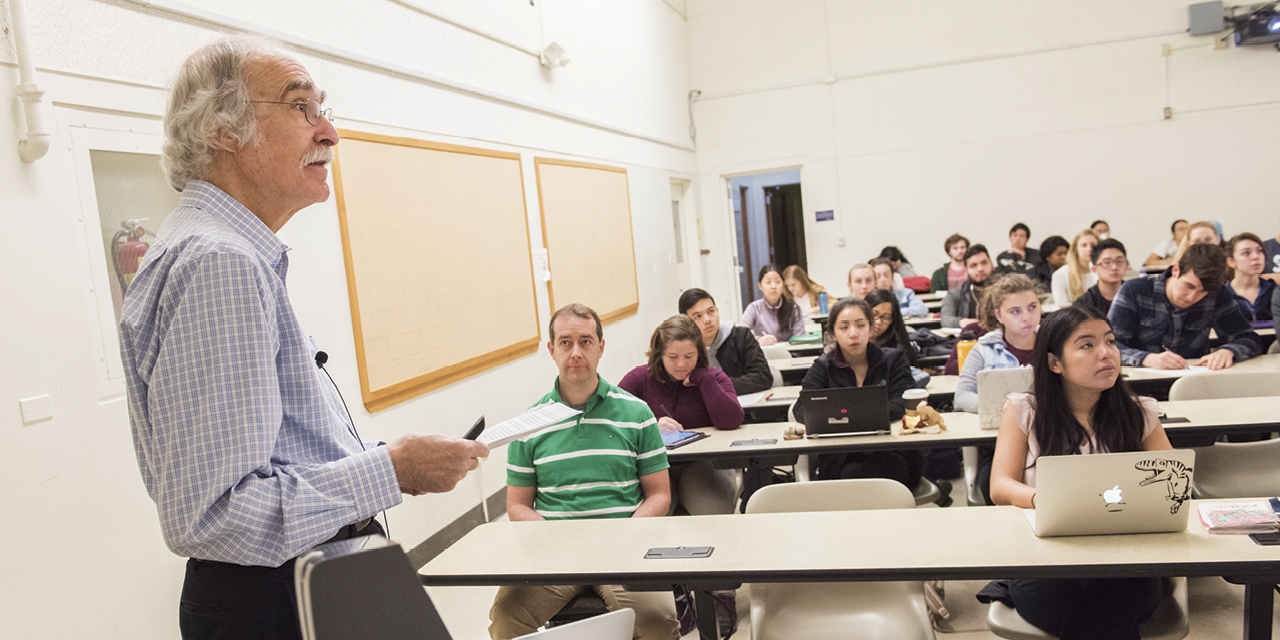Gateway to cancer research
Popular undergraduate course inspires future scientists
Last spring, Petra Dahms’ Facebook profile picture carried the banner “I’M WITH SCIENCE.” The UC Davis graduate’s inspiration: “Cancer Biology,” one of her courses.
“Cancer Biology was one of my favorite classes and contributed to my decision to pursue a career in cancer research,” says Dahms, now working at Stanford University. “The class — and working with Dr. Barlow for the summer on a research project — were truly life changing for me.”
Dahms’ sentiments were echoed by Wang Cao, an undergraduate biology major at Nanjing University in China, who also took Cancer Biology last year through UC Davis Extension. Speaking via Skype from Nanjing, he says he was particularly surprised to learn how complex the biology underlying cancer is. The course fueled a fascination with immunotherapy.
Old idea updated
Offered by the UC Davis Department of Microbiology and Molecular Genetics, Cancer Biology is run this spring quarter by Martin Privalsky, distinguished professor, and Sean Collins, assistant professor. Jacqueline Barlow, assistant professor, instructed the class last spring quarter. Other faculty members have made important contributions as guest lecturers.
Privalsky remembers that a similar but less scientifically oriented course targeted to non-majors was offered about 30 years ago, which covered some basic science as well as social issues around cancer.
“The course was very well received by a diverse group of students,” recalls Privalsky, then a guest lecturer for the class.
The course fell by the wayside over the years, but Wolf-Dietrich Heyer, professor and department chair, approached Privalsky about reviving it with a more scientific focus. The general title belies the depth and breadth of this upper-division class, which is now aimed at biological sciences majors but also offered to anyone (with permission) regardless of background.
The updated Cancer Biology provides a firm grounding in cell biology and cancer genetics, and covers the basics of clinical treatments, including chemotherapy, radiation, surgery, personalized medicine and immunotherapy. The course uses the second (2014) edition of the classic 900-page tome, “The Biology of Cancer,” by Robert Weinberg, which provides a comprehensive introduction to the subject, taking readers from the basics to a solid foundation of knowledge.
Lessons of cancer widely applicable
About 70 students took the popular class last year, and enrollment is expected to be even higher this year. While more than half the students are pre-med or have an interest in pursuing another health science career, there are always some students in the class from other fields, such as zoology or plant sciences. The instructors would like to see students with even more diverse backgrounds join the class.
“Focusing on the normal state and then on how things go awry is a good model to better understand any biological system,” Privalsky says. “The course really provides a wonderful opportunity to integrate knowledge from other classes.”
Class instructors want students to come away understanding that scientific progress is incremental, so sudden news of a cure for cancer is unlikely. And yet the basic understanding of cancer biology is continuously advancing. This is the essence of scientific knowledge, they argue, and what leads to improved therapies, higher cure rates and better prognoses than were possible decades ago for many cancers.
Reaching beyond the science
What students do after graduation from UC Davis is not tracked, so it is not known how many pursue medicine or cancer research after taking the course. The instructors are thrilled to hear that some have been inspired to embark on such careers, but emphasized that this is not their only goal
.“Everyone has some personal experience with cancer, whether it is a friend, family member or even the student who has had to confront it,” says Privalsky. “We approach the course from multiple angles, with the aim that students will learn the science but will also connect on a more human level.”
The last few lectures of the quarter-long course are devoted to societal and psychological aspects of cancer, including personal and financial impacts. Some of the guest lecturers discuss their own experiences with the disease, further driving home the real-world relevance of what students have learned in class. The instructors hope that all students will be able to talk about cancer more comfortably and with a greater understanding as the matter inevitably arises during their lives.
Launching the next generation
Dahms and Cao have kept in touch with Barlow, who taught the course last year. Dahms is currently a research assistant in a Stanford laboratory, investigating transplant rejection in the lymphatic and cardiovascular systems.
“The information I learned in Cancer Biology has been invaluable to my research experience,” she says. Dahms plans to continue to “be with science” and is applying to doctoral programs in cancer biology, genetics and molecular biology.
After Cao finished the class, he embarked on two biomedical research projects at Melbourne University in Australia — one in colon cancer and the other in immunotherapy. Now back at Nanjing University, he will pursue a doctoral degree at Melbourne University after graduation, with plans to continue immunobiology research.
“I find that I love it!” he adds with evident delight.


